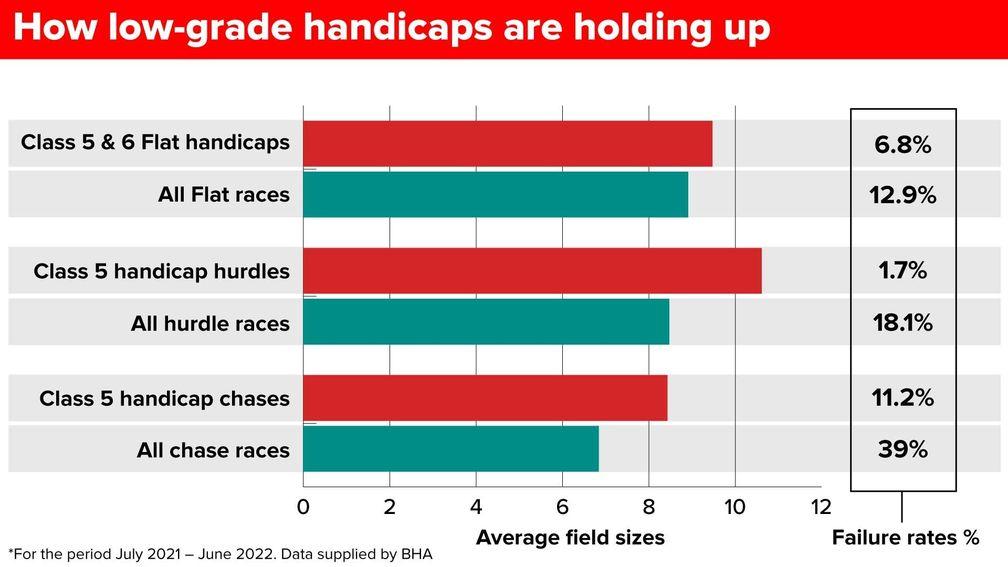BHA has 'no plan to revisit' ban on overseas runners in low-grade handicaps

The BHA has insisted a ban on overseas-trained runners in the lowest grade of handicaps on the Flat and over jumps is here to stay until there is a change in circumstances in British racing.
Only last month, leading Irish trainer Gordon Elliott labelled the decision to uphold the ban as "a joke" but the BHA's chief operations officer Richard Wayman said that, having now looked at the matter twice since it was introduced in September 2020, the cross-body Racing Group would not be asked to reconsider it.
Wayman said: "It is reasonable to question whether providing a handicap programme for lowly rated overseas trained horses delivers a significant net benefit that does anything to support the future of our sport."
The BHA largely kept its counsel as to what the future might hold when the decision to maintain the ban was first announced a fortnight ago.

But the authority has now provided statistical data which it says supports its view, arguing that low-grade handicaps are the least troubling area of the programme book in terms of field-sizes; that the success-rate of overseas-trained horses in such races was disproportionate; and that they served a part of the British horse population that, far from being in decline, was under pressure from being balloted out of suitable contests.
Wayman acknowledged the ongoing issues British racing faces with small field sizes but said of the data: "Our lower-class handicaps generally already provide competitive fields. While we would
acknowledge that there are times of the year – particularly the summer – when field sizes at all levels are under pressure, Class 5 and 6 handicaps consistently deliver higher average field
sizes and lower failure rates [ie races with five or fewer runners] than the rest of the race programme."
While Class 5 and 6 handicaps on the Flat average 9.47 runners as opposed to 8.9 across the entire programme, there is a much greater disparity over jumps.
Class 5 handicap hurdles average more than two extra runners per race when placed against all hurdle races (10.61 runners against 8.47), while Class 5 chases also boast a sizeable advantage when compared to all races over fences (8.43 runners against 6.84).
The same data set – which stretches between July 2021 and June 2022 – demonstrates that only 1.7 per cent of low-grade handicap hurdles attracted the dreaded 'fail' tag, with five or fewer runners compromising the range of bets that can be offered. In contrast, almost one in five (18.1 per cent) hurdle races fell into the failed category.

It is perhaps not surprising that such a relatively well-supported sector of the race programme suffers from a high rate of being oversubscribed and thus running the risk of being balloted out.
Fifty-eight per cent of all horses denied a run in such circumstances were in the bottom two classes of Flat handicaps and the bottom step of the jumping pyramid.
Wayman pointed to the changing balance of the horse population in Britain as a factor, with a three per cent decline in the overall number of horses in training since 2019. He said: "Lower-rated horse numbers have grown and they now make up a larger share of the horse population than in the past.

"For example, in June 2022, 2,773 [or 26.6 per cent] of Flat horses in training were rated 70 or below. In June 2015, the same group of horses totalled 2,214 and made up only 21.8 per cent of the Flat population."
Arguably the most contentious part of the BHA's original argument is what it felt was the disproportionate rate at which overseas-trained horses (overwhelmingly those coming from Ireland) won at the lowest level of British racing.
The BHA has released detailed impact value assessments of each sector of the race programme dating back to 2012, which it argues provides clear proof that Irish-trained horses at the lower end of the scale have outperformed their allotted marks.
Segmenting low-grade handicap hurdles in ratings bands of 5lb, the figures show that eight of the types of race boasted a success-rate well above the expected impact value, a pattern repeated in handicap chases.

Wayman said: "Given the cost of bringing a horse from abroad to Britain, it would be reasonable to expect higher win impact values than the standard 1.00.
"However, the impact values for horses rated up to 70 on the Flat and, to a slightly lesser extent, up to 115 over jumps, illustrate that in lower-grade handicaps, overseas-trained runners significantly outperform domestically trained horses.
"It is also worth adding the historical sample sizes are at their largest at these lower levels, thereby increasing the reliability of the data and its message."
Read more on this . . .
Fix bias towards foreign runners in handicaps, urge British trainers (Members' Club)
'That's not fair' – O'Brien backs Elliott's call to open races to Irish runners
Bar on Irish runners in low-grade handicaps an 'absolute joke' - Gordon Elliott

The Front Runner is our latest email newsletter available exclusively to Members' Club Ultimate subscribers. Chris Cook, a four-time Racing Reporter of the Year award winner, provides his take on the day's biggest stories and tips for the upcoming racing every morning from Monday to Friday
Published on 4 August 2022inNews
Last updated 19:52, 4 August 2022
- The latest edition of the Racing Post is available to read online now - here's how you can access it
- How Smart View recorded a 76 per cent profit at the Cheltenham Festival
- Smart View is available on the Racing Post app - how to read the revolutionary new racecard
- Levy reform talks 'accelerating' as clock ticks down to April deadline for agreement
- Kieran Shoemark lands another plum Meydan ride for Gosden stable on Trawlerman in Saturday's Dubai Gold Cup
- The latest edition of the Racing Post is available to read online now - here's how you can access it
- How Smart View recorded a 76 per cent profit at the Cheltenham Festival
- Smart View is available on the Racing Post app - how to read the revolutionary new racecard
- Levy reform talks 'accelerating' as clock ticks down to April deadline for agreement
- Kieran Shoemark lands another plum Meydan ride for Gosden stable on Trawlerman in Saturday's Dubai Gold Cup